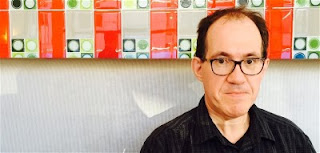I’ve never written a story that involved forensics. Sure, I’ve mentioned fingerprints, crime scenes, and DNA, but only in simple, blink-and-you'd-miss them sentences. I've never dug down into the nitty gritty of how a fingerprint is lifted or DNA is swabbed. I've never hung a plot on forensic science.
My avoidance of this realm of crime fiction writing has been plain and simple: I have had no idea. Also, only a handful of my stories have featured a police detective in the protagonist seat. I've never yet written a police procedural.
I could have YouTubed these CSI things, I guess. I'm no stranger to the Tube and have spent quite some considerable time learning how to pack a pipe, hot-wire a car, become an RA (Royal Academician), and so on. Honestly, if you can think it, there's probably a YouTube video for it (and for many things you probably don't want to think of).
Write what you know—
… the mantra and T-shirt slogan of all writers. And if you don't know, then stay away from it. Which is a double-edged sword for us crime writers--we write about people murdering people. I, for one, can report I have no practical experience in that sort of thing. Which reminds me of an excellent New Zealand novel that explores the premise. Paul Cleave's psychological thriller, Trust No One (2016 Niago Marsh Award winner for Best Crime Novel).Anyway, I've finally gotten some hands-on experience in crime scene investigating. Really, really good experience.
I went on a training course in forensic science here in Auckland with a handful of work colleagues (software). Team building, CSI edition. A four-hour, immersive masterclass in crime scenes: fingerprints, shoe prints, blood splatter, trace evidence, and DNA. Our teacher was the real deal--
an actual CSI professional, fully qualified, with 32 years' experience (Scotland Yard and New Zealand Police).We examined a simulated crime scene (a life-size mannequin/dummy for a dead body), replete with murder weapon, shattered skull, blood splatter, and a roomful of clues. We budding Poirots and Marples were kitted out in proper crime scene PPE: scene suit, gloves, and blue booties that slipped on over our shoes. Working in teams of two, each team was provided with a hefty carry case full of field equipment needed for gathering evidence: fingerprint powder & brushes, lift tape & cards, tweezers, UV light, evidence pouches, scissors, swab sticks, distilled water, and so on.
We lifted and documented fingerprints from tins, cups, and a windowsill. We swabbed beer bottles for DNA and collected up fibres and a shoe print left by the murderer. We even determined the murderer was left-handed, based upon fingerprints left on the weapon and from the tell-tale flicks of blood on the wall. At the end, we ran the fingerprints we had collected through a computer database to look for a match. And we got one. All our teams of two correctly identified the killer from a pool of about thirty suspects.Needless-to-say, the afternoon was not for the faint of heart.
In addition to the hands-on experience, we also learned a lot about the history of forensics. Forensic, from the Latin forēnsis, meaning "of or before the forum." Back in ancient Rome, criminal cases would be decided based upon the evidence presented by the accused and the accuser. Whoever of the two presented the best argument and delivery would win.
We learned about Edmond Locard, the father of modern forensic science and criminology. He set up the first crime scene investigation laboratory in 1910 and pioneered many of the CSI methods still in use today. He also coined Locard's Exchange Theory, which is: Every contact leaves a trace. That's a handy piece of theory to remember. Writer Trivia: Georges Simenon is known to have attended some of Locard's lectures, circa, 1919.
I'm not, nor will ever be, a hardcore forensics writer, but having a better understanding of the processes will certainly lead to its inclusion (in more depth) in my future stories.
Tell me if you have something similar in your town up there in North America. Do the FBI or RCMP run courses like these?
Where we went:
Forensic Insight Ltd.Something I prepared earlier. An article I wrote back in 2014 about fingerprints and an infamous Auckland robbery/murder.


